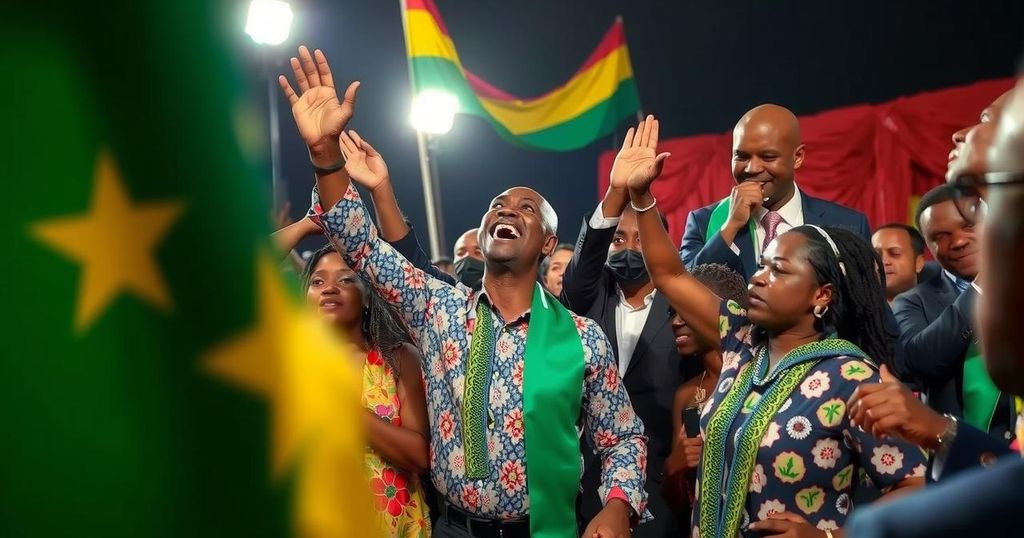Senegal’s Ruling Party Secures Victory in Legislative Elections

Senegal’s ruling party, PASTEF, has claimed a decisive victory in the recent legislative elections following President Faye’s earlier presidential win. Despite opposition leaders conceding, allegations of fraud marred the process. Faye aims to implement reforms blocked in a previous parliament while addressing pressing economic issues, including high unemployment and budget deficits.
Senegal’s ruling party, PASTEF, has declared a decisive victory in the recent legislative elections, with nearly all votes counted and local media reports highlighting the party’s strong performance across multiple polling stations. This success arrives just months after President Bassirou Diomaye Faye triumphed in the presidential elections, thereby paving the way for the enactment of his ambitious reform agenda. Government spokesperson Amadou Moustapha Ndieck Sarre expressed gratitude to the Senegalese people for their support. Conceding defeat, the leaders of Senegal’s major opposition parties acknowledged PASTEF’s victory. Barthelemy Dias, head of the opposition coalition SAMM Sa Kaddu, congratulated PASTEF on their win. However, former President Macky Sall, now leading an opposition group from abroad, alleged that the election process was compromised by significant fraud, accusations that lacked detailed evidence. Upon his election earlier this year, President Faye had expressed intentions for reform, hindered by a previous opposition-controlled parliament. He had articulated plans targeting corruption mitigation and revisions to fishing permit policies while ensuring the populace received a fair share of the nation’s natural resources. Faye’s initial success in the presidential race, securing 54% of the first-round vote without the need for a runoff, suggested a favorable outlook for parliamentary gains. The leadership of Faye, alongside his advisor Ousmane Sonko, encountered legal challenges they attributed to political persecution under previous administrations. Former President Sall had previously incited unrest and protests prior to the elections by contesting a proposed delay to the electoral process. The state of the opposition is further complicated by the involvement of former Prime Minister Amadou Ba and local leaders like Dakar’s Mayor, Barthelemy Dias, who have engaged in a highly competitive campaign. While the campaign included some violent incidents, it remained largely peaceful. The new government has faced criticism concerning its handling of high unemployment rates, cited at over 20%, and an apparent failure to address the needs of the populace adequately. The Senegalese government reported discrepancies in the public finance audit, revealing a larger budget deficit than anticipated during Sall’s tenure. This discrepancy has placed Senegal’s engagement with the IMF at risk as assistance has been suspended until a review is completed. Meanwhile, to align with election promises, the government has taken steps to reduce the prices of essential commodities, despite the potential for further fiscal strain.
The ruling party’s claim of victory in Senegal’s legislative elections marks a pivotal moment in the government’s trajectory aimed at implementing significant reforms. Recent political history in Senegal demonstrates a contentious environment characterized by allegations of electoral fraud and political repression, particularly focusing on the new leadership’s commitment to transformative policies. The socio-economic context, including unemployment rates and public finance challenges, encapsulates the hurdles faced by the administration as they seek to enact their agenda.
In summary, Senegal’s legislative elections have resulted in a significant victory for the ruling PASTEF party, enabling President Faye to pursue his reformative goals. Though opposition parties conceded, allegations of electoral fraud indicate ongoing tensions in Senegal’s political landscape. The president now stands at a crossroads, managing internal challenges while striving to fulfill the promises made during his campaign amidst economic difficulties and high public expectations.
Original Source: www.dw.com







